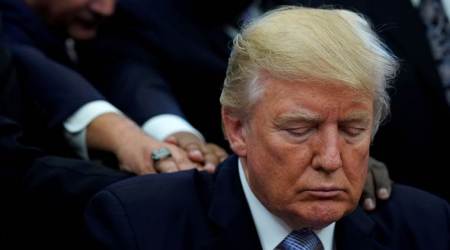 The ideal way forward would be for Pakistan to see the light but those calling the shots are too deeply involved with the proxy guardians of its regional policy for a draining of the swamp. (File)
The ideal way forward would be for Pakistan to see the light but those calling the shots are too deeply involved with the proxy guardians of its regional policy for a draining of the swamp. (File)
Pakistan is still fashioning its response to the shock delivered by US President Donald Trump’s new Afghanistan policy. Pre-election, Trump had promised a break from US military engagement abroad. His Afghanistan policy, announced on August 21, was indeed a break from the past, but in the most unexpected way. Trump called out Pakistan for running safe havens for “agents of chaos, violence and terror” and announced there would be no military withdrawal from Afghanistan just yet. In a double shock to Islamabad, he asked India to do some heavy lifting on economic assistance and development in Afghanistan. The immediate manifestation of the new policy was a “pause” in disbursing $255 million military financial assistance to Islamabad, from the $1.1 bn promised in 2015, until Pakistan proved its credentials on the terrorism front. Pakistan’s initial official reaction was to suspend bilateral visits and talks with the US, but despite this and the grandstanding in the Pakistani parliament by a range of political actors, there is a recognition that this is a turning point with the US. Irrespective of its “stronger than steel” relations with China, and the “peanuts” it is getting from Washington, Pakistan knows it is not just about the money – it cannot cut itself off from the West. Pakistani envoys across the world will assemble in Islamabad this week as the government reviews its foreign policy in view of the “new ground realities”.
The ideal way forward would be for Pakistan to see the light but those calling the shots are too deeply involved with the proxy guardians of its regional policy for a draining of the swamp. What Pakistan does will also depend on Trump’s own attention span to the policy he has laid down, and the stomach in the chaotic and unsettled Trump Administration to carry it through. To borrow a phrase from the open letter the US media wrote to Trump when he took office, for Pakistan the Trump presidency is for a maximum of eight years, if that; Pakistan’s interests in Afghanistan, on the other hand, are forever. Expect a few tactical changes, but no change in strategic objectives. Moreover, for an open-ended military plan in Afghanistan — “not for nation building, but to kill terrorists” as Trump emphasises — the US needs Pakistan inside the tent than outside.
For these same reasons, India’s satisfaction at the speed bump that has hit US-Pakistan relations may be premature. Trump spoke of deepening the strategic partnership with India, but couched India’s role in Afghanistan as something owed to the US, because “India makes billions of dollars in trade with the United States”. India is in Afghanistan not because it is obliged to help the US, but to secure its own interests. It certainly helps New Delhi that the US presence will continue, but Washington has always been an unreliable partner on the Afpak front. Now Trump’s own unreliability, the uncertainties he has unleashed in his Administration, and the mounting challenges he faces nationally make him unknowable even after seven months in office, and make it difficult to take anything he says, good or bad, too seriously.

